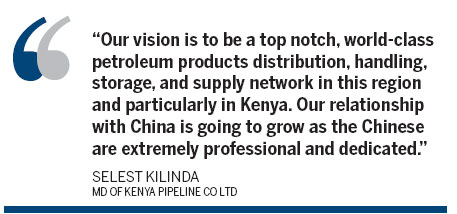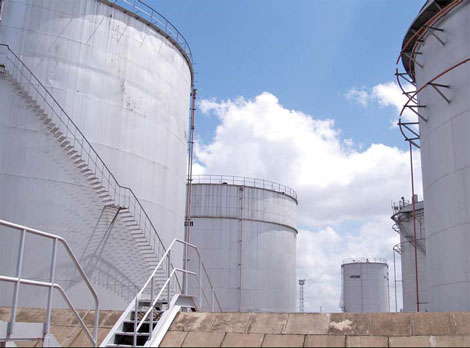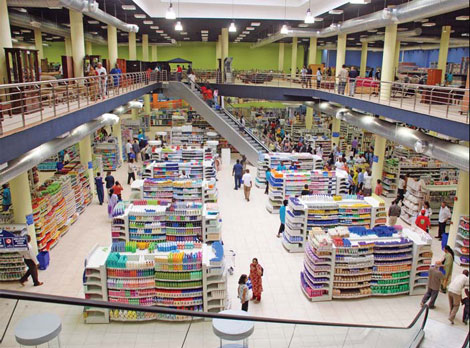Photo
Open for business in every sector
(China Daily)
Updated: 2010-05-03 07:13
 |
Large Medium Small |
|
Nation open for cooperation in oil drilling, exploration and storage projects. |
|
Retail giant Nakumatt offers Kenyans the best selection of local and international goods at reasonable prices. |
Investors encouraged to grasp wealth of new opportunities
Promising foreign direct investment (FDI) opportunities can be found right throughout Kenya's diverse economy and range of business sectors, manufacturing industries and commercial services.
The government has identified the private sector and foreign investors as crucial to the achievement of Vision 2030's economic and social goals as Kenya looks to gain middle-income status and set the benchmark for other countries in East Africa and beyond.
Expanding the provision of housing and accommodation is one of the Vision 2030's key goals as ministers look to fulfill their pledge of building 200,000 new homes per year over the next two decades. As demand for housing reaches a record high - especially in the main urban areas of Nairobi and Mombasa - the country's building and construction industry is braced for one of the busiest periods in its history.
With the government seeing its role as a facilitator, the vast majority of new homes will be developed through private sector investment. Investors and developers are being encouraged to join forces with the National Housing Corp (NHC) - a State-owned organization that aims to ensure the efficient provision of adequate and affordable housing and housing-related services.
As the principal implementing agency of the government's housing policy, NHC has put in place a program of measures aimed at facilitating the acquisition of land and the subsequent construction and sale of new residential developments.
The corporation has developed countless projects since it was established 43 years ago, and is particularly keen to hear from Chinese investors and construction companies as it looks to develop land in cities and towns across the country.
With more than 20 branches across the country, retail goods giant Nakumatt Holdings Ltd is leading the stampede towards higher living standards in Kenya and is well positioned to cash in on the growing middle class market.
As Kenya works hard to boost its socioeconomic status, disposable income levels are rising rapidly, with the ripple effect seeing increasing numbers of Kenyans buying their own homes and household goods.
With a focus on quality, value, service, variety and lifestyle, Nakumatt Holdings Ltd's stores offer a wide variety of local and international brands at reasonable prices.

The company operates more than two dozen outlets and plans to increase that number through the opening of new stores in Kenya and neighboring countries like Rwanda, Uganda, and Tanzania.
"We are planning to expand to all five countries in southeast Africa and are already present in Rwanda and Uganda, as well as being the largest retailer in Kenya," says Nakumatt managing director, Atul Shah.
"We are looking for equity partners to help us achieve our growth plan. By 2015 we hope to have 50 or more stores spread across six or seven countries including Burundi, Ethiopia and Sudan."
China is playing a key role in the retailer's strategic development as Chinese manufacturers have a large presence in the enterprise's international supply chain.
"A third of our products are imported and 80 percent of them come from China so the Chinese are big suppliers to Nakumatt and they are playing an important part in our growth. I visit China every two years to look for new ideas and goods as they make good quality products at reasonable prices," said Atul Shah.
Construction opportunities can also be found in the education sector as the government looks to lay the foundations for future generations through the building of new primary and secondary schools, as well as colleges and universities.
Through this ambitious drive to boost education facilities and standards, Kenya is making a firm commitment to the development of a knowledge-based economy that will prepare its young people for today's competitive global environment.
"We need to construct more schools and universities, and expand and rehabilitate existing ones," said Kenyan President Mwai Kibaki.
"There is high demand for university education and the construction of private secondary schools is encouraged and offers excellent opportunities for investors in this sector."
These developments will be supported by a network of centers of excellence that focus on the hospitality, agriculture, trade, manufacturing, financial services, engineering, and information and communications technology (ICT) sectors.
A series of major improvements to old training and technical facilities is also planned, especially at the Kenya Textile Training Institute, the National Industrial and Vocational Training Center, and industrial training centers at Kisumu and Mombasa.
While not as richly endowed in natural resources as other African nations, Kenya's range of minerals includes ash, barite, lead, nickel, and chromite.
A comprehensive mining policy targets investors through the formation of joint ventures and public private partnerships (PPPs). FDI opportunities exist in mineral exploitation and prospecting, traditional mining, and value addition.
Meanwhile, with a firm commitment to environmentally friendly policies, Kenya runs sustainable programs that protect its precious land, wildlife and habitats.
In the past decade, climate change has had an adverse impact on Kenya's agricultural-based economy through droughts, floods, and mudslides that caused havoc and stunted economic growth.
Officials are seeking PPPs and foreign funding in environmental monitoring and early warning system technologies, as well as education, training and awareness programs, waste management programs, and pest control.
As a major trade and transit hub for East Africa, Kenya plays a very important role in the transportation of products to the wider region, including various land-locked countries such as Uganda, Ethiopia, Rwanda, and Burundi.
Established in 1973 as a state corporation run under the Ministry of Energy, Kenya Pipeline Co Ltd operates a modern, secure, and efficient pipeline system for the transportation of refined petroleum products from Mombasa to Nairobi, the western towns of Nakuru, Kisumu and Eldoret and the neighboring countries of Rwanda, Burundi, Uganda, Tanzania and the Democratic Republic of Congo.
In collaboration with the government, the forward-thinking company is the lead institution for the transportation, distribution and storage of petroleum products. From its base in Nairobi, Kenya Pipeline Co's highly skilled and experienced workforce coordinates projects nationwide.
The company's facilities and operations include over 900 km of pipeline, ancillary pumping, storage tanks, plant equipment and installations.
Led by managing director Selest Kilinda since August 2009, Kenya Pipeline Co provides the most cost-effective transportation network in East and Central Africa for refined petroleum products.
"Our vision is to be a top notch, world-class, petroleum products distribution, storage and supply network in Kenya and beyond," he says.
In order to meet growing demand and reduce the number of fuel trucks on the country's roads, Kenya Pipeline Co enhanced its capacity by putting up four new pump stations at Samburu, Manyani, Makindu and Konza which nearly doubled its flow rate from 440,000 liters per hour to 800,000 liters per hour.
Other major projects now being undertaken include the extension of the oil pipeline to Uganda and construction of liquefied petroleum gas import handling and storage facilities, as a joint venture with Kenya Petroleum Refineries and India's Bharat Petroleum.
A 325 km parallel pipeline from Nairobi to Eldoret is currently being built by the China Petroleum Pipeline Engineering Corp. On completion this project will boost the supply of petroleum products to western Kenya and beyond.
Kilinda sees his company playing a strategic role in the region's development especially as the recent discovery of oil fields in neighboring Uganda could result in a new refinery being built that would require the construction of new pipelines in Kenya.
He says the firm is open to strategic partnerships as it holds an advantage on "way leaves" (rights of way) for developing new infrastructure.
"Any investor who teams up with us will find us an ideal partner. We are in a very strong position to continue dominating the transportation, storage and distribution of oil in the region."

According to Kilinda, Chinese technology and experience will form an important part of this expansion plan. "Our relationship with China is going to grow. The Chinese are extremely professional and we admire their work ethic and dedication," he says. "We strongly feel they are the right people to work with and we know they have existing facilities for financing projects."
In a final message to potential investors, Kilinda adds: "There is a lot of Chinese investment in Kenya because the returns are good and our doors are open for more partnerships. The enhancement of our pipeline is an example of what good partnership can achieve."

(China Daily 05/03/2010 page24)









